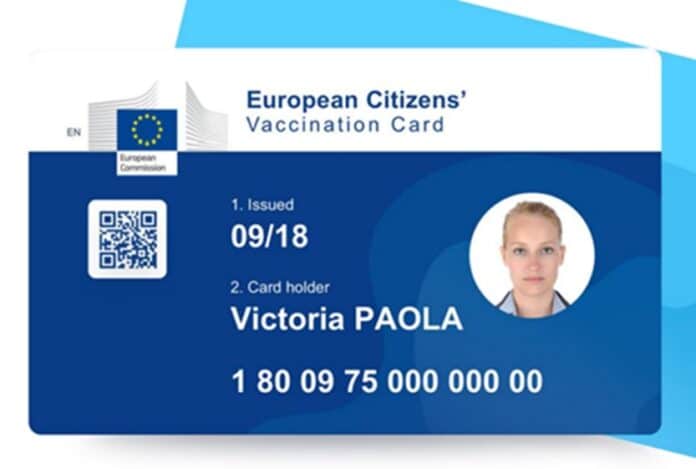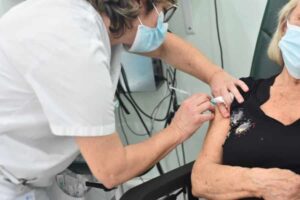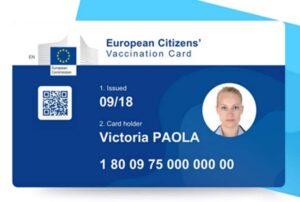“Instrument for tracking, controlling and coercing citizens will lead us to five points of no return”
Two petitions gathering thousands of signatures are urging Portugal to reject the implementation of the European Vaccination Card, and pull out of the pilot project currently underway.
One of the petitions has already been delivered to parliament (as it has more than double the necessary signatures required for it to be put to parliamentary debate); another has been launched by three medical specialists working for the country’s general health directorate (DGS).
Both documents warn of the ‘chilling’ bottom line, outlined by others when the pilot project study was first announced.
The Petition for the Rejection of the European Vaccination Card (gathering, to date, more than 16,500 signatures) explains that the EUVABECO project (the acronym for European Vaccination Beyond Covid) “aims to intensify and control vaccination in the European Union, and is in the process of launching 5 ‘tools’ that should govern public and private health by 2030”.
These tools are:
– Medical tool: a decision-making support system for doctors, health professionals and patients, facilitating ‘informed’ choices regarding vaccination;
– Social tool: a triage system to facilitate targeted vaccination campaigns, as well as continuous monitoring for ‘more effective vaccine delivery’;
– Industrial tool: an electronic leaflet for vaccines to enable ‘more flexible distribution of vaccines’;
– Modelling and forecasting tool: a disease simulator to raise awareness of the dynamics of infections in the community and the impact of public health interventions;
– Digital tool: a cross-border vaccination card, enabling global and lifelong healthcare control;
It is this last tool that has been launched in five EU countries: Belgium, Greece, Latvia, Germany and Portugal.
EUVABECO’s agenda foresees the implementation of this European Vaccination Card in 2026, which, integrated into the World Health Organisation’s (WHO) global digital certification system, is being combined with two other projects, namely: European Digital Identity and European Digital Currency;
As such, say the three signatories (dentist Marta Gameiro, psychologist Joana Amaral Dias and lawyer Alexandra Marcelino), the card appears to be devised as “an instrument for tracking, controlling and coercing citizens, which, if not stopped, will lead us to five points of no return”.
These points are
- suppression of individual freedom – “another step towards a surveillance society where every move, every health decision will be tracked and potentially controlled by the authorities”;
- risk of discrimination and social exclusion – “As with the Covid digital certificate, this card carries a huge risk of discrimination against citizens who, in exercising their right not to adopt the vaccination recommendations imposed by the health authorities, could be excluded from various aspects of life in society, facing restrictions such as: access to certain services; travelling; or even being unable to work, etc.”
- dangers of centralising health data – “who can guarantee that such personal data won’t be used for purposes other than those originally intended?”
- illusion of security – “security cannot justify excessive control and constant surveillance of citizens”;
- global control – “by linking the European Vaccination Card to European digital identity and digital currency, the European authorities are laying the foundations for a society in which every aspect of citizens’ existence wil be conditioned by their submission to supposed health dictates”.
The petitioners stress that Portugal already has “a centralised record of users’ vaccinations in the computer system of the country’s health centres”. It is a record available to anyone who is registered on the SNS 24 portal. Thus, their question: ‘why is it necessary to collect vaccination information via another format? What is the real purpose of the European Vaccination Card?’
Alluding to the “fundamental, inalienable rights, enshrined in Article 8 of the Charter of Fundamental Rights of the European Union (CFREU) and Article 35 of the Constitution of the Portuguese Republic, which are also recognised in Article 16 of the Treaty on the Functioning of the European Union”, the petition outlines that everything points to the thinking behind the European Vaccination Card being a “frontal violation of the most essential rights” – and so demands Portugal’s “immediate withdrawal of Portugal from the EUVABECO project”.
Critics could, potentially, argue that the three people who launched this petition are not ‘working within the state health system’. But this is not a criticism one could use for the second petition which comes from no less than three professionals working within the general health directorate: Bruno Alves, Miguel Arriaga and Benvida Santos.
They too call on “Dear Portuguese citizens” to “take action to reject the implementation of the European Vaccination Card in Portugal”, using similar arguments – the DGS already has its own system which ‘respects individual autonomy and fundamental rights’.
Very much like the first petition, this one warns of “excessive surveillance and social control without consent (…) jeopardising citizens’ freedoms”.
“At this critical time”, say the three scientists (critical, because the pilot project is already well underway), “we urge the DGS to protect the rights and privacy of the Portuguese by avoiding coercive and invasive measures. SIGN UP TO THIS CAMPAIGN NOW!”
These moves come at a point where a court in the Netherlands has set a date for various ‘movers and shakers during the Covid pandemic’ (including Bill Gates) to answer a civil case brought by Dutch plaintiffs alleging that Gates and others, individually and as a group, deliberately misled them (and the wider public in general) about the safety and effectiveness of Covid vaccines.
Seen through this prism, EUVABECO, denoting ‘European Vaccines Beyond Covid’, takes on a very different meaning: one in which citizens seek to retain freedom of choice in future experiences with vaccines.
To access both the petitions mentioned above click here and here. To read more about the European Vaccination Card, click here.




















